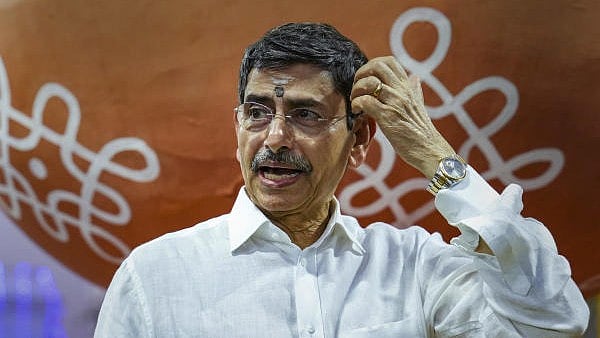
Tamil Nadu Governor R N Ravi.
Credit: PTI Photo
New Delhi: Tamil Nadu Governor R N Ravi on Thursday said "large-scale" infiltration in the Northeast is not just about migration for livelihood but a "strategic" move, aimed at engineering another partition of India.
Speaking at the inaugural session of “Seema Vimarsh”, a two-day international conference on cross-border infiltration organised at Delhi University’s historic Vice-Regal Lodge, Ravi said the threat was serious and "no army can stop this."
"The kind of infiltration taking place in Bengal, Assam, and other Northeastern states is not just people coming here for a better life and economic opportunities, but it is strategic for another partition... a work in progress.
"We have to worry about this because no army can stop this. This is about Bharat’s unity and integrity," Ravi said.
The governor said the problem of illegal immigration has persisted since independence, and successive governments have treated the Northeast as a distant frontier.
“After independence, we left our borders to our soldiers, thinking them to be areas of far away. Illegal immigration is the biggest problem in our Northeast areas since independence, and we left the people of the Northeast on their own, thinking that these people are different from us.
"Because of such thinking, the internal conflict between the tribals of Northeast and the rest of the country came into existence only after independence. There was no such conflict before independence,” he said.
He credited the Rashtriya Swayamsevak Sangh (RSS) for its role in strengthening the sense of inclusion among the people of the region.
“A group that has always worked in the Northeast for the betterment and to enhance inclusion is the Rashtriya Swayamsevak Sangh. I want to thank the workers of the RSS for doing such good work for years," Ravi said.
Delhi University Vice-Chancellor Yogesh Singh, who chaired the session, said the army should stop playing the tune 'Sare jahan se acha' as its writer, poet Muhammad Iqbal, believed that Hindus and Muslims were culturally incompatible.
"In Delhi University, we have decided that we will not teach Iqbal. The man who advised Jinnah to not talk about constitutional rights for Muslims but cultural incompatibility with Hindus... the same argument was repeated by Pakistan’s current Army Chief, Asim Munir.
"So, the question is not whether Iqbal should be taught in universities or not, but why don’t we as a society feel bad about it that we taught a poet who talked about partition and cultural incompatibility,” he added.
"Our army too plays 'Sare jahan se acha Hindustan hamara'... The army should not play this song because the people of our country agreed with 'Sare Jahan Se Acha Hindustan Hamara', but he (Iqbal) himself never believed in it," Singh said.
He urged the Vice-Chancellors of other universities attending the event to think about dropping Iqbal from their syllabus.
He further called for academic debates on border security and national boundaries.
"The discussion on border security is absolutely necessary in the country that has witnessed servitude for 800 years. Our economic growth and security depend on secure boundaries. Our borders were not secure, and every 30 years, our country was attacked.
"We got independence but witnessed partition on August 14, 1947. Such discussions will not only enhance the knowledge of people but also make them mentally stronger,” he said.
The DU VC also referred to the Indus Water Treaty and said India's interests were not kept in mind when the deal was signed in 1960.
"We should have felt bad that we have given 80 per cent water of our three rivers to Pakistan. This change of mindset we need to develop. It is a good thing that the present government has put the Indus Water Treaty in abeyance,” he said.
The two-day hybrid-format conference, themed “Cross-Border Infiltration: Impact on Socio-Economic, Cultural, and Milieu”, is jointly organised by Seema Jagran Manch, Motilal Nehru College (Evening), and the Centre for Independence and Partition Studies, DU.
The event is being attended by vice-chancellors of central universities, directors and chairpersons of institutions, government officials, foreign delegates, army veterans, DGPs, academicians, journalists, and over 150 participants in offline and online sessions.